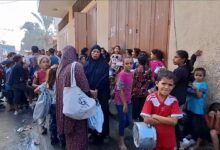Most violent year in Syria since 2020, senior UN official tells Security Council
 This year of conflict in Syria is “on track to be the most violent since 2020”, with the potential for even greater devastation looming on the horizon, the UN Deputy Special Envoy for Syria told the Security Council on Thursday.
This year of conflict in Syria is “on track to be the most violent since 2020”, with the potential for even greater devastation looming on the horizon, the UN Deputy Special Envoy for Syria told the Security Council on Thursday.
“Many millions of Syrians are still outside their country or struggling to survive in a complex landscape of de facto authorities, foreign armies, armed non-state actors and listed terrorist groups,” Najat Rochdi highlighted, adding that 100,000 are arbitrarily detained or missing.
Israeli airstrikes on Syria have also increased significantly, both in frequency and scope. Just yesterday, dozens were killed in a strike near Palmyra – likely the deadliest Israeli strike in Syria to date.
While Israel says its strikes address targets linked to Iran, Hezbollah or Palestinian Islamic Jihad, Ms. Rochdi points out the strikes have been conducted on residential areas in the heart of Damascus, where civilian infrastructure was also hit.
Over half a million fleeing from Lebanon
Over half a million people have fled Israeli airstrikes in Lebanon and crossed into Syria since late September, and there remains a steady flow of movement, with thousands of people driven across the border into Syria every day, the head of the UN Agency for Humanitarian Affairs (OCHA) said in her address.
An estimated two-thirds are Syrians, more than half are children and over 7,000 are pregnant women, Edem Wosornu added.
Due to the damage from airstrikes, people have resorted to navigating crossings on foot or seeking out longer and riskier alternative routes.
It has also caused serious disruptions to essential imports and exports, which are now down by 40 to 50 per cent, Ms. Rochdi underlined, noting that this drives up the prices of gasoline and basic goods “leaving the most vulnerable in a precarious state”.
“The safety and security of all of those arriving from Lebanon must be ensured, both at the crossing, and thereafter as they move throughout Syria – by all authorities and de facto authorities,” she emphasised.
70 per cent of Syrians already in need
Before the most recent influx of half a million people from Lebanon, more than 70 per cent of Syrians – around 16.7 million – were already in need of humanitarian assistance, Ms. Wosornu said.
The impact on food security is particularly alarming, with nearly 13 million people already facing acute food insecurity in Syria – the fifth highest total globally – while the UN World Food Programme (WFP) has been forced to reduce its assistance by 80 per cent in the past two years due to funding cuts, Ms. Wosornu added.
The situation is also especially severe for displaced people in camps and informal sites.
In northwest Syria, for instance, some 1.4 million internally displaced persons, mostly women and children, require urgent assistance. Approximately 730,000 of these individuals are still living in tents, Ms. Wosornu reported.
“Without additional funding, respiratory infections and hospitalizations are likely to surge, particularly among young children,” she said, highlighting the emerging outbreak of suspected cholera in camps where people are living in “crowded detention-like conditions”.
Need for de-escalation
“After almost fourteen years of war and conflict, there are no quick-fix technocratic solutions to these challenges, which are deeply political,” Ms. Rochdi stated.
Addressing these issues requires a national ceasefire in line with Security Council resolution 2254, which stresses protection of civilians and unfettered humanitarian access, she told the Council.
“If all sides signal readiness to act constructively, responsibly, and practically, then we have the best chance to harness existing and new dynamics into opportunities for progress,” she underscored.
“This is a time of profound uncertainty and danger in the region; it is also exactly the time to shape a path to allow the Syrian people to realise their legitimate aspirations, to restore Syria’s sovereignty, unity, independence and territorial integrity and to safeguard international peace and security,” Ms. Rochdi concluded.



